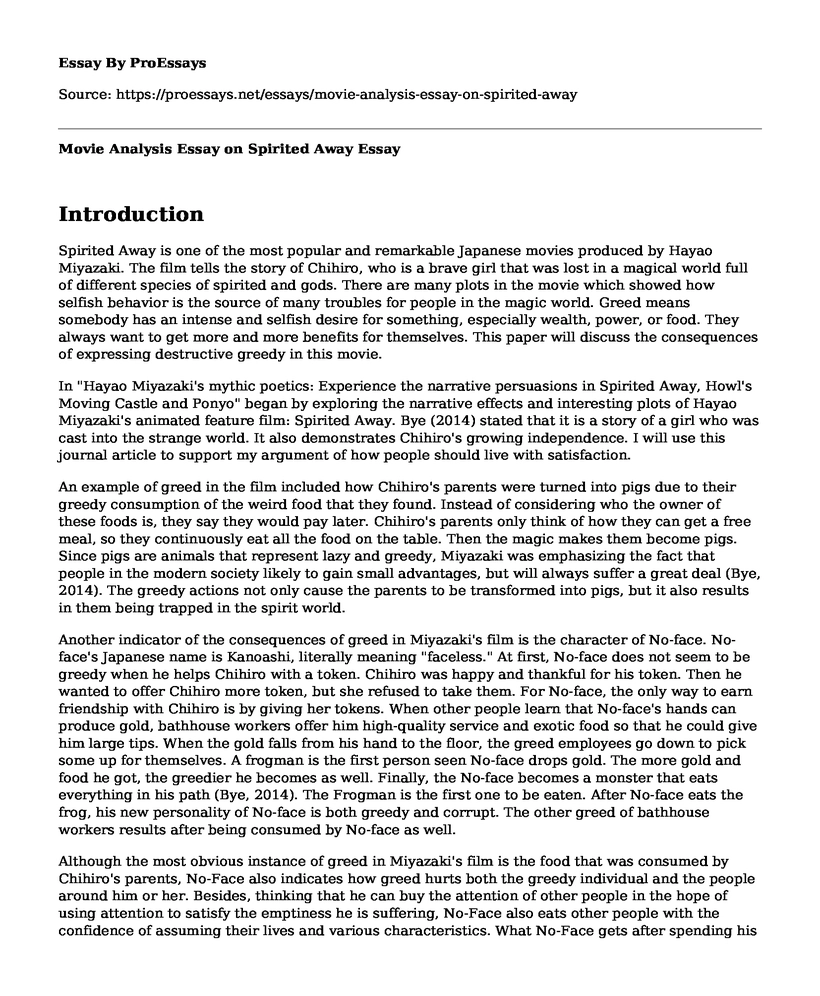Introduction
Spirited Away is one of the most popular and remarkable Japanese movies produced by Hayao Miyazaki. The film tells the story of Chihiro, who is a brave girl that was lost in a magical world full of different species of spirited and gods. There are many plots in the movie which showed how selfish behavior is the source of many troubles for people in the magic world. Greed means somebody has an intense and selfish desire for something, especially wealth, power, or food. They always want to get more and more benefits for themselves. This paper will discuss the consequences of expressing destructive greedy in this movie.
In "Hayao Miyazaki's mythic poetics: Experience the narrative persuasions in Spirited Away, Howl's Moving Castle and Ponyo" began by exploring the narrative effects and interesting plots of Hayao Miyazaki's animated feature film: Spirited Away. Bye (2014) stated that it is a story of a girl who was cast into the strange world. It also demonstrates Chihiro's growing independence. I will use this journal article to support my argument of how people should live with satisfaction.
An example of greed in the film included how Chihiro's parents were turned into pigs due to their greedy consumption of the weird food that they found. Instead of considering who the owner of these foods is, they say they would pay later. Chihiro's parents only think of how they can get a free meal, so they continuously eat all the food on the table. Then the magic makes them become pigs. Since pigs are animals that represent lazy and greedy, Miyazaki was emphasizing the fact that people in the modern society likely to gain small advantages, but will always suffer a great deal (Bye, 2014). The greedy actions not only cause the parents to be transformed into pigs, but it also results in them being trapped in the spirit world.
Another indicator of the consequences of greed in Miyazaki's film is the character of No-face. No-face's Japanese name is Kanoashi, literally meaning "faceless." At first, No-face does not seem to be greedy when he helps Chihiro with a token. Chihiro was happy and thankful for his token. Then he wanted to offer Chihiro more token, but she refused to take them. For No-face, the only way to earn friendship with Chihiro is by giving her tokens. When other people learn that No-face's hands can produce gold, bathhouse workers offer him high-quality service and exotic food so that he could give him large tips. When the gold falls from his hand to the floor, the greed employees go down to pick some up for themselves. A frogman is the first person seen No-face drops gold. The more gold and food he got, the greedier he becomes as well. Finally, the No-face becomes a monster that eats everything in his path (Bye, 2014). The Frogman is the first one to be eaten. After No-face eats the frog, his new personality of No-face is both greedy and corrupt. The other greed of bathhouse workers results after being consumed by No-face as well.
Although the most obvious instance of greed in Miyazaki's film is the food that was consumed by Chihiro's parents, No-Face also indicates how greed hurts both the greedy individual and the people around him or her. Besides, thinking that he can buy the attention of other people in the hope of using attention to satisfy the emptiness he is suffering, No-Face also eats other people with the confidence of assuming their lives and various characteristics. What No-Face gets after spending his money on purchasing gifts for others is false friendships and shallow gifts as given by bathhouse workers. Upon being attached to the illusion of being admired and loved, No-Face continues to consume the food offered by the bathhouse workers more and more. The implication by Miyazaki regarding No-Face is that people usually assume that true happiness comes from possessing material goods (Bye, 2014). Instead, the disillusionment that comes from living a lie necessitates that people have a constant flow of material goods if they are to feel happy. Therefore, Miyazaki shows that happiness cannot be bought by engaging in selfish behavior, whereby greed only results in trouble and chaos.
Although many characters in "Spirited Away" are affected by greed in one way or another, Miyazaki seems to indicate that not every member of modern society is greedy. Chihiro, who was the main character of the narrative whose parents were spirited away, is a 10-year-old girl who seems to be immune to the effects of greed, which can be attributed to the fact that she lives in the moment rather than chasing happiness (Bye, 2014) The unselfish quality of Chihiro is contrasted from the greed of other characters in the film, whereby she manages to overcome all temptations offered by various phenomena in her surroundings.
Reference
Bye, S. (2014). Connecting the pieces in'Howl's Moving Castle'. Screen Education, (74), 112. Retrieved from https://search.informit.com.au/documentSummary;dn=436114508904036;res=IELAPA
Cite this page
Movie Analysis Essay on Spirited Away. (2022, Dec 02). Retrieved from https://proessays.net/essays/movie-analysis-essay-on-spirited-away
If you are the original author of this essay and no longer wish to have it published on the ProEssays website, please click below to request its removal:
- Research Paper on Beauty Societal Standards
- Essay Sample on Learning About Death Through Television
- Citizen Kane: Film Analysis Essay
- Analysis of Dawson Change in A Few Good Men Film - Essay Sample
- Millennials & Social Media: The Good, the Bad and the Compulsive - Essay Sample
- Essay Example on The Banker: Audacious Tale of Financial & Racial Empowerment
- Essay Example on Teen Magazines: Keeping Teens in the Know!







